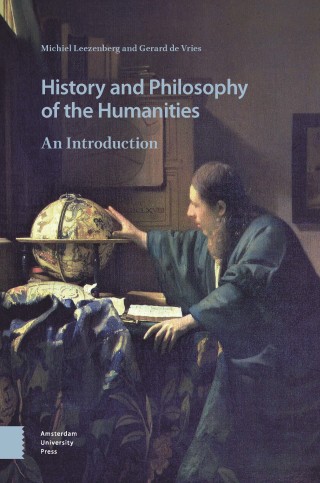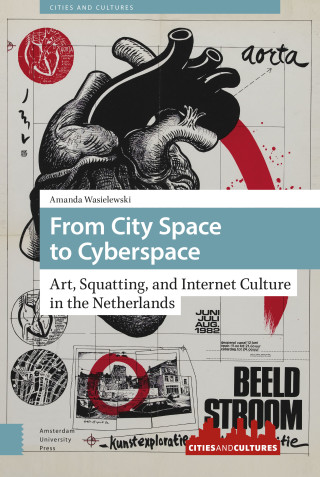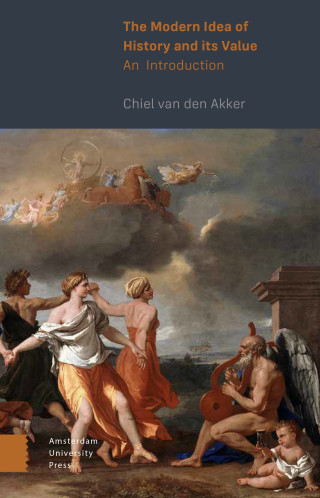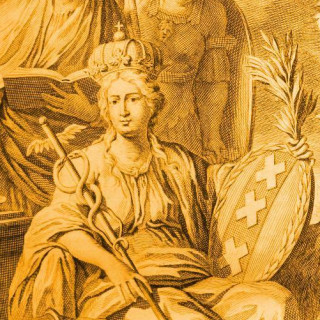
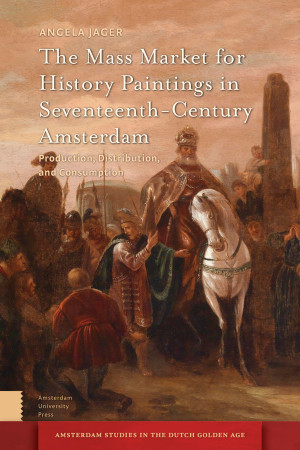
- Title
- The Mass Market for History Paintings in Seventeenth-Century Amsterdam
- Subtitle
- Production, Distribution, and Consumption
- Author
- Angela Jager
- Price
- € 146,00 excl. VAT
- ISBN
- 9789462987739
- Format
- Hardback
- Number of pages
- 294
- Language
- English
- Publication date
- 24 - 11 - 2020
- Dimensions
- 17 x 24 x 2.3 cm
- Partner

- Categories
- Art and Material Cultures
- Cultural Studies
- Dutch and The Netherlands
- Early Modern Studies
- Sociology and Social History
- Discipline
- History, Art History, and Archaeology
- Preview
- Download Preview
- Also available as
- eBook PDF - € 145,99
Acknowledgements
List of Figures and Tables
List of Abbreviations
Introduction
1. The trade in cheap history paintings: Dammeroen, Doeck and Meijeringh
2. 'Bunglers' and 'duds': the painters listed in Doeck and Meijeringh's inventories and their career prospects
3. Painting by numbers: the production of 'dime-a-dozen' works in Dammeroen, Doeck and Meijeringh's art shops
4. History paintings in Amsterdam households, 1650-1699
Conclusion
Bibliography
Index
List of Figures and Tables
List of Abbreviations
Introduction
1. The trade in cheap history paintings: Dammeroen, Doeck and Meijeringh
2. 'Bunglers' and 'duds': the painters listed in Doeck and Meijeringh's inventories and their career prospects
3. Painting by numbers: the production of 'dime-a-dozen' works in Dammeroen, Doeck and Meijeringh's art shops
4. History paintings in Amsterdam households, 1650-1699
Conclusion
Bibliography
Index
Reviews and Features
"This book explores a part of the art market that has been mostly invisible to scholars. In so doing, it upends many earlier assumptions, and offers new approaches to questions about the Dutch art market."
- Rebecca Tucker, Colorado College, The Seventeenth Century (2022)
"To my mind, the importance of this publication is hard to overestimate. [...] Jager is the first author to create an impression of the type of paintings that must have accounted for a lion’s share of painting output in the Republic; the type of works most Dutch town-dwellers were certainly familiar with. This is a very enlightening, though sometimes also a rather humbling experience, for these are most definitely not the type of works that we know today, from our modern museum galleries, exhibition catalogues and reference works – as CODART’s new canon. The book is, therefore, essential reading for anyone who wants to expand their view of painting in seventeenth-century Holland."
- Christi M. Klinkert, Curator of Old Masters, Stedelijk Museum Alkmaar. Translated from the Dutch to the English by Lynne Richards. Oud Holland, February 2022
"Jager's carefully executed study makes a welcome contribution to our understanding of the booming seventeenth-century art market and yields a number of surprising new insights. [...] Jager convincingly shows that history paintings were the most popular type of mass-produced paintings in the extensive inventories of these three Amsterdam art dealers. [...] In short, Jager offers a much needed correction to our understanding of the Dutch seventeenth-century painting by giving us a first extensive insight into the cheaper segment of the market."
- Anna Tummers, Leiden University, BMGN Low Countries Historical Review, Volume 136 (2021)
- Rebecca Tucker, Colorado College, The Seventeenth Century (2022)
"To my mind, the importance of this publication is hard to overestimate. [...] Jager is the first author to create an impression of the type of paintings that must have accounted for a lion’s share of painting output in the Republic; the type of works most Dutch town-dwellers were certainly familiar with. This is a very enlightening, though sometimes also a rather humbling experience, for these are most definitely not the type of works that we know today, from our modern museum galleries, exhibition catalogues and reference works – as CODART’s new canon. The book is, therefore, essential reading for anyone who wants to expand their view of painting in seventeenth-century Holland."
- Christi M. Klinkert, Curator of Old Masters, Stedelijk Museum Alkmaar. Translated from the Dutch to the English by Lynne Richards. Oud Holland, February 2022
"Jager's carefully executed study makes a welcome contribution to our understanding of the booming seventeenth-century art market and yields a number of surprising new insights. [...] Jager convincingly shows that history paintings were the most popular type of mass-produced paintings in the extensive inventories of these three Amsterdam art dealers. [...] In short, Jager offers a much needed correction to our understanding of the Dutch seventeenth-century painting by giving us a first extensive insight into the cheaper segment of the market."
- Anna Tummers, Leiden University, BMGN Low Countries Historical Review, Volume 136 (2021)
Angela Jager
The Mass Market for History Paintings in Seventeenth-Century Amsterdam
Production, Distribution, and Consumption
Millions of paintings were produced in the Dutch Republic. The works that we know and see in museums today constitute only the tip of the iceberg — the top-quality part. But what else was painted? This book explores the low-quality end of the seventeenth-century art market and outlines the significance of that production in the genre of history paintings, which in traditional art historical studies, is usually linked to high prices, famous painters, and elite buyers. Angela Jager analyses the producers, suppliers, and consumers active in this segment to gain insight into this enormous market for cheap history paintings. What did the supply consist of in terms of quantity, quality, price, and subject? Who produced all these works and which production methods did these painters employ? Who distributed these paintings, to whom, and which strategies were used to market them? Who bought these paintings, and why?
Author
Angela Jager
Angela Jager is an art historian of early modern Dutch and Flemish painting. She received her PhD from the University of Amsterdam in 2016. Her publications include articles in the journals Oud Holland and JHNA, as well as contributions to exhibition catalogues and edited volumes. She co-edited the CATS proceedings Trading Paintings and Painters’ Materials 1550—1800.

